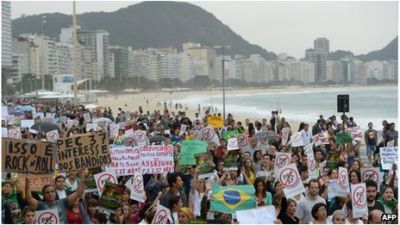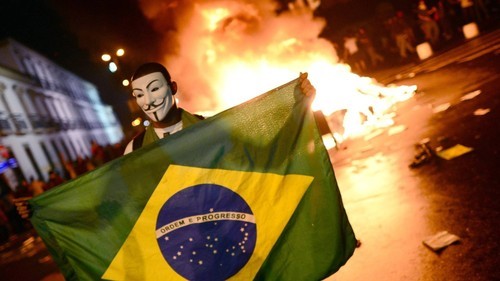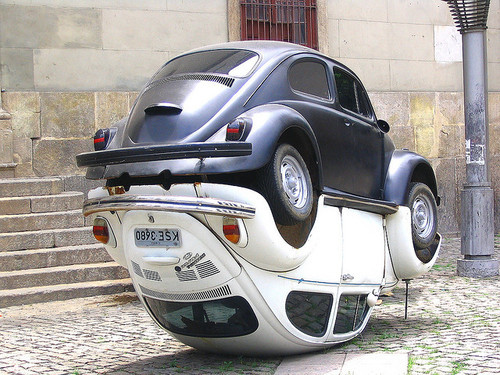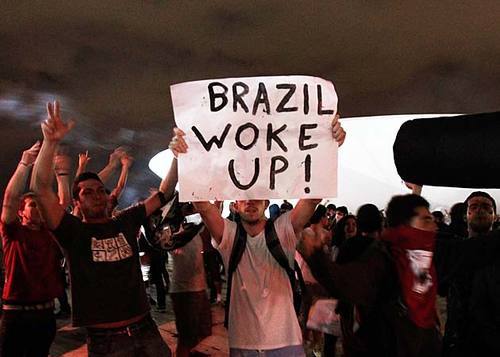
 Brazil Uncovered
Brazil Uncovered
Friday 12th July 2013 | Chris
In 2010 I packed up my bags and jetted off to Rio De Janeiro. Like many others before me, I was drawn to the city's immense beauty, colour and atmosphere. It's probably a cliché to say that Rio promised to have everything I could ask for, but it really ticked all the boxes; with world-famous sandy beaches, breathtaking sights, amazing parties and carnivals, great food and most importantly great football-loving people.
I had an incredible stay in the Cidade Maravilhosa - which is a nickname for Rio that translates as 'marvellous city', but the bag of fond memories I took home carried a sense of fraudulence and superficiality. After completing three months of volunteering in the favelas my eyes caught a glimpse of the corruption, violence and unjustness present in this fascinating nation. It's easy to overlook these problems, but lately they have started to manifest through mass-protests that have spanned across Brazil and captured worldwide media attention.

Like many other cities of global importance, Rio de Janeiro is a place of contrasts. On the one hand, there are well-developed Americanized parts such as Barra da Tijuca where adolescents go to surf or tan on pristine white beaches in the day and then stroll into the glamorous and glitzy nightclubs in the evening. On the other, there are areas steeped in culture such as the colourful neighbourhood of Lapa. The overwhelming spirit of Lapa on a Friday night provides an energetic contrast to the serene and slightly pretentious Barra Da Tiguca, as it's colonial aqueduct becomes awash with Latin spirit and a richly diverse crowd filters through to the native sounds of Samba and Baile Funk.
The theme of contrast was depicted most apparently to me after the weather in Rio started to take a turn for the worse. The city experienced a period of heavy rainfall which was the worst on record in 40 years. This left much of Rio in ruins and there were many lives lost in the favelas, where the shanty housing was unable to withstand such an onslaught of rain and the subsequent flooding. On my ascent up into the hills to work I came across a clutter of washed-up favela houses, many of which had become abandoned piles of rubble with no homeowners left to be seen. Overlooking this patch was a large detached property that stood tall on a platform above, out of reach of the now-defeated favela homes. The two very different worlds were adjoined by a trail of wreckage from where the overlooking property's swimming pool had collapsed and created a landslide which carried debris onto the shanty houses beneath it. In this small area, the poor and the rich were literally living side by side and this had led to this bizarre and catastrophic occurrence.

The poor distribution of wealth, which is an underlying problem throughout Brazil, is very apparent in Rio through the comparison of living conditions between the rich and the poor. In recent times many of the poorer people have become worse off because of forced evictions for sports-related construction projects. This epitomises the attitude of the Brazilian government as they have no concern for the poorer communities and would rather sweep their troubles under the carpet, so to speak.
In recent times the International Olympic Committee, FIFA and local organisers have failed to consult adequately with local communities in Brazil, and expenditure for upcoming sporting events have become symbolic of an austerity economy beyond the reach of any semblance of democracy. This had lead to real time democracy on the streets for the first time in the form of protests, with city officials already repealing the bus fare hikes.

The protests have grown past the bus fare rate campaign, as shown by the ‘It’s not about 20 cents’ movement. The protesting feels long overdue as there has been malcontent in Brazil for a long time towards corruption, inequality and the disregard for the public health and education system. Mass-protests have taken place with hundreds of thousands of people coming out at a time to participate in the biggest protests Brazil has seen since the country was ruled by a dictator from 1964-1985.
Ultimately these two major sporting events could help jump-start the world's sixth largest economy, but underlying problems should not be ignored. For millions in Brazil, FIFA has become a tainted brand associated with a distant global elite who profit at the expense of local people. Worst of all, they have been given a pass to do so by the Brazilian government who are now making a frantic effort to tidy up the country so it appears to the world that Brazil is a leading player in the game of nations, but at what cost? Many believe Brazil might suffer the same drain on resources and overspend as Greece did in preparation for 2004 Olympics, causing economic disaster and even more poverty. Even if this does not happen, importance should be placed on improving things for everyone, particularly when such a large proportion of the population are living in extreme poverty.

It seems that Brazil is a country still battling the same old problems it was when I visited three years ago, except now the public has woken up and united to get their voices heard. Unfortunately there is a feeling that they are fighting a loosing battle against the ignorant elite and their trusty armed forces, who aren't exactly famous for their tact. FIFA have come to the conclusion that the social unrest is now over, but there are still protests on the streets, strikes and more police brutality - with these stories now being less well-documented. In a country where football is the national religion, people want to enjoy the World Cup but the tense situation is hindering the chances of a successful event next year. I came across this interesting video aimed at convincing tourists to boycott the 2014 World Cup and the 2016 Olympics. If you are thinking about travelling to Brazil in the near future, watch this video so that you can understand the troubles that Brazil faces in preparation for these monumental sporting events.
by Chris Schwartz
